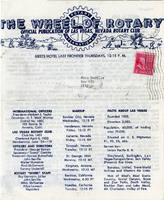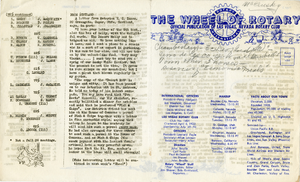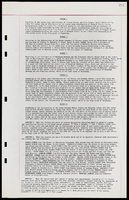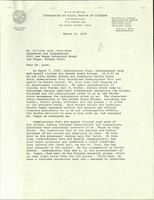Search the Special Collections and Archives Portal
Search Results
Gans, Jim
E. James (Jim) Gans was raised in Seattle, Washington and Yakima, Washington before he moved to Las Vegas, Nevada in 1950. Gans started in school at Bonanza Elementary, then to a new Hyde Park Junior High where he was part of the first class and on to Rancho High School where he graduated. His first jobs were mowing lawns, a paper route, and working at a dog boarding kennel for 25-cents an hour.
Person
Cassidy, Butch, 1866-
Robert Leroy Parker (1866-1908), also known as Butch Cassidy, was an American train and bank robber during the late 1800s. He was notorious for being the leader of the “Wild Bunch”, a gang of criminal outlaws in the Old West. Parker’s life and death has been a main element in many “Wild West” films and literature to this day.
Person
James B. McDaniel Architectural Records
Identifier
Abstract
The James B. McDaniel Records (1960-1978) comprise the plans and drawings created by Las Vegas, Nevada architect James McDaniel who worked independently as James Brooks McDaniel Architect (from 1960-1978) and with a partner as Moffitt and McDaniel Architects, Limited (during the 1970s). This collection includes materials from over 115 projects managed by McDaniel. Records include oversized architectural drawings, and files of architectural projects. McDaniel designed many University of Nevada, Las Vegas (UNLV) buildings, residential, commercial, and landscape designs for Las Vegas clients. Also included are business files of construction estimates, specifications, invoices, change orders, and correspondence.
Archival Collection

The Wheel of Rotary Las Vegas Rotary Club newsletter, August 5, 1954
Date
Archival Collection
Description
Text

The Wheel of Rotary Las Vegas Rotary Club newsletter, January 5, 1950
Date
Archival Collection
Description
Text

Transcript of interview with Brian Cram by Stefani Evans and Claytee White, October 28, 2016
Date
Archival Collection
Description
Throughout his career, former Clark County School District Superintendent (1989–2000) Brian Cram took his father's words to heart. He heard them repeatedly over the years as he watched and later, helped, his father clean classrooms at Robert E. Lake Elementary School: this place—the classroom—this is the most important place. Cram was born in Caliente, where his father worked on the railroad. In 1939, when Cram was a toddler, the family moved to Las Vegas and his father found work first as a sanitation engineer at a hospital, and then at CCSD as a custodian. The elder Cram, who spent his formative years in the Great Depression, prided himself on doing "good, honorable work" as a custodian, because the work—the classroom—mattered. Even so, he wanted more for his son. Cram largely ignored his father's advice during his four years at Las Vegas High School, where he ran with The Trimmers car club, wore a duck tail and a leather jacket, and copped an attitude. Cram's swagger, though, d
Text



